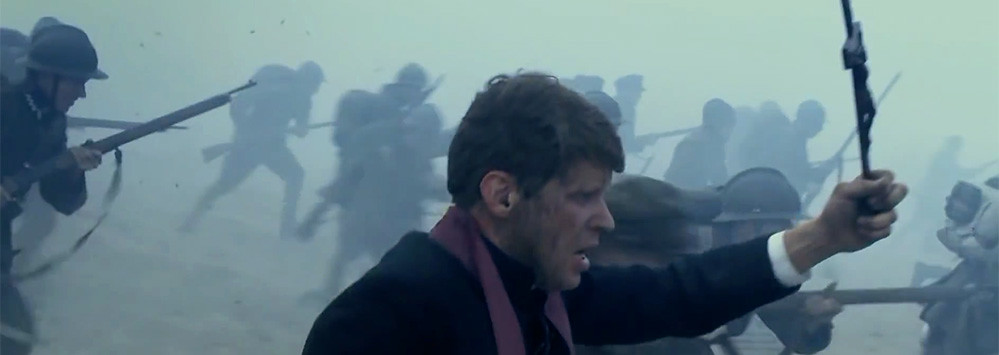The Miracle of the Vistula, 1920: When Catholic Poland stopped the Soviet invasion of Europe
I found an exciting video subtitled in English and posted on Paulus4AD's Youtube channel, made with images from the movie "Bitwa Warszawska 1920", filmed by Polish filmmaker Jerzego Hoffmana in 2011.
Lenin's goal: to spread communism throughout Europe
The facts that the video recounts happened during the Polish-Soviet War (1919-1921), initiated after the recovered independence of Poland (it had been occupied by Prusia, the Austrohungarian Empire and Russia for more than a century). Encouraged by his victory over the Tsarist armies, Lenin intends to extend communism to the rest of Europe by force, occupying Poland and then supporting the German Communists, who in January 1919 had led the violent Spartacist Uprising. In Poland the fate of Europe will be decided.
Poles prepare for defense with little hope for success
In the summer of 1920 the situation is dramatic for John Paul II's native country. Men and women, older and younger (beginning with the Scouts: Poland is a country with a great tradition of Scouting), bourgeois, peasants and workers, civilians and military prepare to defend their homeland and prevent the Red Army from subjugating a country proud of His Catholic faith. In the parishes the priests call to the Poles to assume their responsibility towards their people going to the combat against the invader. The international community assumes that Poland will be defeated. All foreign diplomatic delegations leave Warsaw, with the exception of the British delegation and the Nuncio Achille Ratti, who two years later will become Pope Pius XI. Soviet troops arrive in the vicinity of Warsaw. The only allies the Poles have are a group of volunteer American pilots (the so-called Kościuszko's Squadron, who will fight in this battle) and a few hundred British and French military advisers (among them Charles de Gaulle, who during this contest will get the largest Polish military decoration, Virtuti Militari). Hungary, a country traditionally friendly to Poland, has tried to send 30,000 armed horsemen in support of the Poles, but the Czechoslovak Government has not allowed them to pass.
Overcoming the Soviets with a cross to the front
The Soviets have planned to cross the Vistula River and surround Warsaw. On 12 August the town of Radzymin falls, only 23 kilometers from Warsaw. On the 14th, fighting takes place in the village of Ossów, 18 kilometers from Warsaw. Many of its supporters are young Polish university students, all of them volunteers. Next to the defenders is the priest Ignacy Skorupka, chaplain of the Polish Army. Father Skorupka dies in these fights when he encourages his compatriots, leading his advance with only a cross in his hand. That afternoon the Soviets are totally unexpectedly rejected. Ossów is the first skirmish that ends in Polish victory since the beginning of the Bolshevik offensive. At present a monument in Warsaw recalls the heroism of Father Skorupka.
Bolshevik advance stopped on the day of the Assumption of the Virgin
On 15 August, the communist advance on Warsaw was halted. In a very hard battle that leaves many casualties, the Poles manage to surround the Bolsheviks and put them in flight. The famous Polish cavalry rejects the invaders with blows of sabers and spears. Significantly, and against all odds, the red march to Warsaw is stopped on the day of the Assumption of the Blessed Virgin. The Poles will remember him as "the Miracle of the Vistula". Today, in commemoration of that victory, Poland celebrates every August 15 the day of its armed forces.
Communism is forced to postpone its expansion more than two decades
For Communist Russia the defeat of Warsaw is devastating. Their leaders fear that Poland, enraged, invade Russia and call for peace, which begins in October with a ceasefire and is consolidated with the signing of the Treaty of Riga on 18 March 1921, leaving the border between both countries delimited very similar to what it was in 1772. The Soviet defeat against Poland has consequences for the whole of Europe: Lenin abandons his policy of expansionism and adopts the thesis of "socialism in one country", endorsed after his death by the XIV Congress of the Communist Party of the Soviet Union. The value and sacrifice of the Poles allows postponing more than two decades, until after World War II, communist rule over Europe. Because of this, in communist Poland this battle is the object of an iron censorship and manipulation. Today free Poland remembers those heroes with pride and gratitude. In the rest of Europe they have practically forgotten. Edgar Vincent, one of the British representatives in Poland at the time of this battle, wrote years later:
"The history of contemporary civilization knows no event of greater importance than the battle of Warsaw, 1920, and no other whose meaning has been more despised."
|
Don't miss the news and content that interest you. Receive the free daily newsletter in your email: Click here to subscribe |
- Most read
- The 'hole' without civil flights around Paris during the opening of the Olympic Games
- Spain vetoes the Russian frigate 'Shtandart', which intended to reach Vigo, in all its ports
- The interior of the Statue of Liberty torch and the sabotage that canceled its visits
- The ten oldest national flags in the world that are still in use today
- The Russian intelligence document that sparked a hoax about French troops
- The BNG boasts of the support of a terrorist group and a dictatorship at a public event
- A virtual tour of ancient Rome in full color, just as it was in its heyday

 ES
ES





Opina sobre esta entrada: